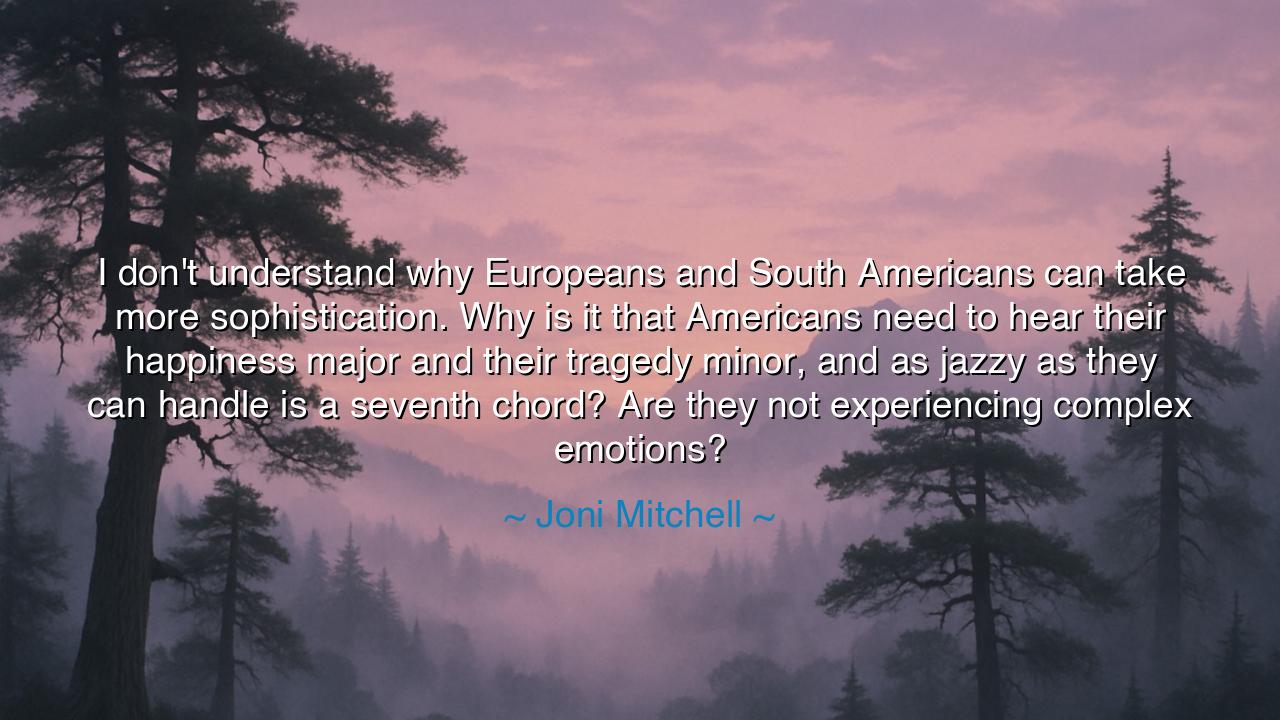
I don't understand why Europeans and South Americans can take
I don't understand why Europeans and South Americans can take more sophistication. Why is it that Americans need to hear their happiness major and their tragedy minor, and as jazzy as they can handle is a seventh chord? Are they not experiencing complex emotions?






When Joni Mitchell asked, “I don't understand why Europeans and South Americans can take more sophistication. Why is it that Americans need to hear their happiness major and their tragedy minor, and as jazzy as they can handle is a seventh chord? Are they not experiencing complex emotions?” she was not merely speaking about music—she was speaking about the soul of a culture. In these words, she questions the emotional simplicity of a people who, despite living amidst wealth and diversity, often demand art that is clear, comforting, and easy to consume. Her lament is for a nation that seeks to flatten the spectrum of feeling into simple binaries: joy or sorrow, light or dark, major or minor. Mitchell’s insight reaches beyond melody—it touches the deepest mystery of the human condition: why do so many fear the complexity of their own emotions?
The origin of her reflection lies in her life as a musician and poet—an artist whose work was too intricate, too daring, too emotionally layered for the commercial mainstream of her time. Born in Canada but embraced by American audiences, Mitchell stood at the crossroads of folk, jazz, and poetry, crafting songs that wove together love, loss, and longing in colors most could not yet name. Her exposure to the rich musical traditions of Europe and South America—where dissonance, rhythm, and nuance were not feared but celebrated—made her question the American insistence on simplicity. To her, this musical simplicity mirrored a deeper emotional limitation, a cultural reluctance to embrace contradiction, to feel joy and sorrow in the same breath, to allow beauty and pain to coexist in art as they do in life.
Her question—“Are they not experiencing complex emotions?”—rings with both wonder and sorrow. Of course, Americans feel deeply; but Mitchell saw a gap between what they feel and what they allow themselves to express. In a culture built on optimism, where happiness is a moral duty and success the highest virtue, darker or more intricate feelings are often hidden. The result, she suggests, is not emotional absence but emotional repression. People turn away from dissonance in art because it mirrors the dissonance within themselves. The simple major chord feels safer than the unresolved tension of a diminished ninth. Yet in that avoidance, something precious is lost—the ability to hold contradiction, to let beauty arise from sorrow, to find harmony within chaos.
The ancients understood this truth well. In Greek tragedy, joy and grief were not opposites but partners in revelation. Euripides wrote of heroes who sang even as they suffered, for he knew that the human heart, like music, thrives in tension. The great composers, too, found glory in complexity. Beethoven, in his later years, deaf and tormented, created symphonies that mixed dissonance and resolution, darkness and light, until they transcended both. The listener who dared to enter his world discovered a higher beauty—the beauty of the whole, where every discord serves a greater harmony. Joni Mitchell’s lament is a modern echo of that ancient wisdom: that to live fully, one must not divide emotion into categories of good and bad, but embrace the full orchestra of the soul.
Her reference to Europeans and South Americans is not a matter of superiority, but of openness. In the passionate rhythms of Brazil, the mournful fado of Portugal, or the haunting tangos of Argentina, sorrow and joy intertwine like dancers who cannot be separated. These cultures understand that life is bittersweet, and they have built music to reflect it. A samba can make one weep even as it makes the feet move; a French chanson can hold irony, melancholy, and delight in a single phrase. In these traditions, complexity is not feared—it is cherished as the mark of truth. Mitchell’s words challenge her own people to cultivate that same depth: to listen, to feel, to allow the unresolved chords of life to sing within them.
And yet, her question is not merely criticism—it is invitation. It calls upon artists and listeners alike to grow, to dare to feel more deeply, to welcome dissonance as a sign of life. She asks us to look beyond comfort and see that the truest happiness is not the absence of sadness, but the dance between both. To live only in the major key is to deny half the song of existence. The wise know that even pain has music in it, and that from the mingling of grief and grace arises something greater than either—a harmony born of truth.
So, my children of the present age, remember this: do not fear the complexity of your emotions. Let your heart play in many keys. When you feel joy, let it be deep enough to hold sorrow within it; when you feel sorrow, let it be rich enough to shimmer with beauty. Seek not only art that comforts, but art that awakens. Listen for the dissonant notes, the strange chords, the music that unsettles you—for in them lies growth. As Joni Mitchell teaches, life’s greatest symphony is not simple, but sophisticated—woven from every emotion the soul can bear. Learn to hear it. Learn to feel it. And when you do, you will discover not just art, but the very heartbeat of what it means to be human.






AAdministratorAdministrator
Welcome, honored guests. Please leave a comment, we will respond soon